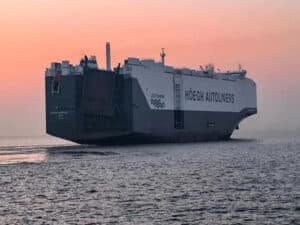
Congressional panel gets a lesson on marine electrification
Written by Nick Blenkey
ABB’s Peter Bryn testifies at hearing yesterday on “The Path to a Carbon-Free Maritime Industry: Investments and Innovation.”
In its hearing yesterday on “The Path to a Carbon-Free Maritime Industry: Investments and Innovation” (see earlier story), the House Coast Guard and Maritime Transportation panel heard testimony from ABB on the key role electrification will play in achieving zero-emission shipping.
“Most alternative propulsion system arrangements are centered around an electrified powertrain,” Peter Bryn, Technical Solutions Manager, North America ABB Marine and Ports, said in his prepared testimony. “Whether diesel or LNG electric hybrids, full battery power, or fuel cell power, most low and zero emissions vessels will employ an electrified powertrain. Electric propulsion can not only cut emissions but also improves safety and reliability while reducing lifecycle costs. An electric-based powertrain is critical as it allows for easy integration of current and future power sources, which is important for Jones Act vessels that often undergo multiple repowers over their sometimes 50+ year lives.”
Among the points made in Bryn’s testimony:
With electric propulsion systems, marine vessels can get to zero emissions. Electric propulsion not only cuts emissions but also improve safety and reliability while reducing lifecycle costs. An electric – based powertrain is also future-proof as new power sources are developed. Whether the power source is fuel cells, batteries, ammonia-fueled generators, or a wave energy harvesting system, electric powertrains can integrate them. This is especially important for Jones Act vessels which often undergo multiple repowers over their sometimes 50+ year lives.
It’s critical to fit the right solution to the vessel. Vessel types are as varied as the missions they serve and cargoes they carry. Ferries, inland towboats, harbor tugs, offshore workboats, and oceangoing vessels all have different operational characteristics that require different low or zero emission technologies. Fortunately, there are a number of such technologies either available today or under development including diesel or LNG electric hybrids, biofuels, fuel cells, and batteries. Accordingly, policies should focus on setting emissions targets for the marine industry, allowing the industry to assemble the best technology solution for meeting emissions and operational goals, and providing support to the marine industry as they meet those targets.
Lifecyle costs of electric powertrains are typically lower than conventional diesel powered vessels. Vessels with electric powertrains and direct current (DC) electrical systems typically cost less to operate over their lifetime due to higher energy efficiency, lower maintenance, and reduced fuel costs. However, their upfront capital costs tend to be higher. This challenge is similar to other recent energy technology breakthroughs, like wind and solar power and electric vehicles. However, through a myriad of research, development, and deployment policies and incentives, those upfront costs have come down considerably and have reached or are approaching cost parity. With appropriate support, the same will happen with zero emission marine technologies.
Low and zero emission marine vessel technologies are in the early stages of adoption and need government and policy support. Today there are commercially available zero emission marine technologies for some segments, like ferries. However, they tend to be more expensive upfront to purchase, which is a big deterrent to ship owners and operators, even though they are cheaper to operate. For other segments like offshore workboats, and oceangoing vessels, cost-effective commercially available zero emission solutions are still in their very early stages of development. To lower costs and reach a fully zero emission vessel fleet, deployment of existing technology and development of new technology must be expedited. The industry would benefit from government investments in research, development, and deployment of zero emission marine technologies.
GREEN THE FEDERAL FLEET
Bryn concluded his written testimony with recommendations on actions that the Federal Government and the Committee could take to increase deployment of existing zero emission technologies, invest in the zero emissions technologies of the future, and “grow U.S.. leadership in the marine sector for decades to come.”
Among these recommendations: Green the Federal Fleet. In addition to Department of Defense ships, the U.S. owned fleet includes Coast Guard, MARAD, and National Park Service vessels. Setting an ambitious, long-term national plan to achieve zero emissions for all these vessels, said Bryn, “would have a meaningful impact directly on vessel emissions and establish the private U.S. maritime industry as a global technology leader.”
Download Bryn’s full written testimony HERE
You can watch the recording of the whole hearing HERE




